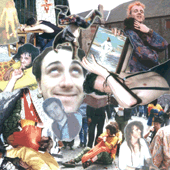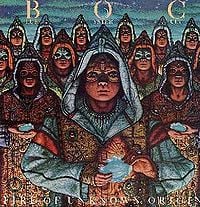| Author |
 Topic Search Topic Search  Topic Options Topic Options
|
Ivan_Melgar_M 
Special Collaborator

Honorary Collaborator
Joined: April 27 2004
Location: Peru
Status: Offline
Points: 19535
|
 Posted: December 11 2014 at 23:32 Posted: December 11 2014 at 23:32 |
NO
I seen musicians abandon music because they don't have money to continue making great music.
Music industry kills music, supporting mediocre "musicians".
IvŠn
|
|
|
 |
richardh 
Prog Reviewer


Joined: February 18 2004
Location: United Kingdom
Status: Offline
Points: 26161
|
 Posted: December 12 2014 at 01:28 Posted: December 12 2014 at 01:28 |
 Ivan_Melgar_M wrote: Ivan_Melgar_M wrote:
NO
I seen musicians abandon music because they don't have money to continue making great music.
Music industry kills music, supporting mediocre "musicians".
IvŠn |
That almost a vote for YES because the whole idea of the music industry is to make money is it not? No one talks about the 'Art Industry' in fact its a phrase that doesn't exist. So why is there a music industry? Music is art and such does not need to be financed. Any musician can have a day job and write and play music in their spare time. Keith Emerson worked in a bank but played in several bands before The Nice got big enough for him to give up the day job. In truth there nothing stopping anyone doing anything as long as they are prepared to work hard enough at it.
|
 |
Stool Man 
Forum Senior Member


Joined: January 30 2007
Location: Anti-Cool (anag
Status: Offline
Points: 2689
|
 Posted: December 12 2014 at 03:27 Posted: December 12 2014 at 03:27 |
 richardh wrote: richardh wrote:
No one talks about the 'Art Industry' in fact its a phrase that doesn't exist. |
[pedantry]Googling "the art industry" just gave me 223,000 hits. The phrase exists in many places. [/pedantry]
|
|
rotten hound of the burnie crew
|
 |
Tom Ozric 
Prog Reviewer


Joined: September 03 2005
Location: Olympus Mons
Status: Offline
Points: 15916
|
 Posted: December 12 2014 at 04:39 Posted: December 12 2014 at 04:39 |
|
Katy Perry is not art. Beyonce is not art. Ed Sheeran is NOT, I repeat, NOT art. Just another manufactured product, just like Coca-Cola, Pepsi and Mitsubishi. Rubbish that sells to mindless spectres.......
Why do so many true artists need to be funded by various appreciators/even curators, that have mega-dollars to spend ??? It's not necessarily a case of 'sellout' in neon lights, but a democratic agreement to pander for the masses. If you believe in your wallet, than good luck to you, if you don't, chances are you will continue to battle it out day by day..........
Edited by Tom Ozric - December 12 2014 at 04:40
|
 |
Ivan_Melgar_M 
Special Collaborator

Honorary Collaborator
Joined: April 27 2004
Location: Peru
Status: Offline
Points: 19535
|
 Posted: December 12 2014 at 09:52 Posted: December 12 2014 at 09:52 |
 richardh wrote: richardh wrote:
 Ivan_Melgar_M wrote: Ivan_Melgar_M wrote:
NO
I seen musicians abandon music because they don't have money to continue making great music.
Music industry kills music, supporting mediocre "musicians".
IvŠn |
That almost a vote for YES because the whole idea of the music industry is to make money is it not? No one talks about the 'Art Industry' in fact its a phrase that doesn't exist. So why is there a music industry? Music is art and such does not need to be financed. Any musician can have a day job and write and play music in their spare time. Keith Emerson worked in a bank but played in several bands before The Nice got big enough for him to give up the day job. In truth there nothing stopping anyone doing anything as long as they are prepared to work hard enough at it. |
The problem is not money, the problem is GREED.
Keith Emerson worked in a bank but he had 19 or 20 years, his father helped him and even paid most of the price of his first Hammond organ and was single.
Professional artists can't have a day job unless they want to spend their life playing in very small venues.
When you have kids and a family, you can't afford to just survive.
|
|
|
 |
Tom Ozric 
Prog Reviewer


Joined: September 03 2005
Location: Olympus Mons
Status: Offline
Points: 15916
|
 Posted: December 12 2014 at 10:48 Posted: December 12 2014 at 10:48 |
Keith did in fact work at a bank, but was fired for 'persistent lateness/lack of interest'..... I think he knew what he wanted to do  ...
|
 |
Dellinger 
Forum Senior Member


VIP Member
Joined: June 18 2009
Location: Mexico
Status: Offline
Points: 12608
|
 Posted: December 12 2014 at 22:18 Posted: December 12 2014 at 22:18 |
 Finnforest wrote: Finnforest wrote:
I think age matters more than status.† Youth.† Generally I'm "knocked out" most often by the music made by artists in their 20s- far more than anything that comes from music "veterans."† It happens in band after band I think about....the spark happens usually in their early years.† So many great albums made by young people.† I can't count all that many great geezer rock albums...although there are certainly some I'm sure.†
Steve Wilson may be one who bucks that trend.† I think he had a better 30s than 20s.†
|
I have also noticed how usually the very best music artists do is from their 20's. Sometimes there's someone who makes a good comeback, who is able to offer wonderful albums at later stages of their lives, but that seems to be the exceptions. That's why I think bands like Yes and Dream Theater, who have recently been looking for replacments on the band, should actually seek someone very young and with extraodinary writing abilites (just as they themselves were at their prime).
|
 |
Dellinger 
Forum Senior Member


VIP Member
Joined: June 18 2009
Location: Mexico
Status: Offline
Points: 12608
|
 Posted: December 12 2014 at 22:27 Posted: December 12 2014 at 22:27 |
 Tom Ozric wrote: Tom Ozric wrote:
I say 50/50. A band that hits it 'big' - now Floyd are a case in point - DSOTM - they could afford incredible stage shows and top-notch equipment. It really didn't spoil them.
Others - Chicago are a good example, hit the 'big time' with a pedestrian ballad, and there goes any will to challenge themselves. So it probably boils down to the nature (and egos) of the artists involved.
.........my thoughts anyway........ |
What I think was great about Pink Floyd is that they just hit it big with Dark Side, they got a taste of selling lot's of albums and getting lot's of money, and instead of selling out and trying to repeast the formula, they came up with Wish you were Here (with Shine On and Welcome to the Machine, which I don't think could be considered attempts at money grabbing)... and even more, then they came up with Animals, which would seem like they were actually trying to make a non commercial album... specially with the coming of punk and all. However, I believe that's the very attitude that made them such legends as they are.
|
 |
Kati 
Forum Senior Member


Joined: September 10 2010
Location: Earth
Status: Offline
Points: 6253
|
 Posted: December 13 2014 at 00:38 Posted: December 13 2014 at 00:38 |
People ruin moozik, not money, especially greedy people who prioritize profit above all creativity. Hugs 
|
 |
Dayvenkirq 
Forum Senior Member


Joined: May 25 2011
Location: Los Angeles, CA
Status: Offline
Points: 10970
|
 Posted: December 13 2014 at 00:43 Posted: December 13 2014 at 00:43 |
I don't know. Maybe yes and no. Depends. On many things, methinks.
- How big is the overlap between "moneymaker" and "good music"? - How easy is it to record a (good or bad) album/song? - ...
Edited by Dayvenkirq - December 13 2014 at 00:44
|
 |
Kati 
Forum Senior Member


Joined: September 10 2010
Location: Earth
Status: Offline
Points: 6253
|
 Posted: December 13 2014 at 00:55 Posted: December 13 2014 at 00:55 |
 Dayvenkirq wrote: Dayvenkirq wrote:
I don't know. Maybe yes and no. Depends. On many things, methinks.
- How big is the overlap between "moneymaker" and "good music"? - How easy is it to record a (good or bad) album/song? - ...
|
Edited by Kati - December 13 2014 at 00:58
|
 |
rogerthat 
Prog Reviewer

Joined: September 03 2006
Location: .
Status: Offline
Points: 9869
|
 Posted: December 13 2014 at 00:56 Posted: December 13 2014 at 00:56 |
 richardh wrote: richardh wrote:
 Ivan_Melgar_M wrote: Ivan_Melgar_M wrote:
NO
I seen musicians abandon music because they don't have money to continue making great music.
Music industry kills music, supporting mediocre "musicians".
IvŠn |
That almost a vote for YES because the whole idea of the music industry is to make money is it not? No one talks about the 'Art Industry' in fact its a phrase that doesn't exist. So why is there a music industry? Music is art and such does not need to be financed. Any musician can have a day job and write and play music in their spare time. Keith Emerson worked in a bank but played in several bands before The Nice got big enough for him to give up the day job. In truth there nothing stopping anyone doing anything as long as they are prepared to work hard enough at it. |
Well, it is the music industry that bankrolled ELP's albums as well as their extravagant live shows. As well as much of the beloved 70s prog music that is celebrated on this website. Music made by musicians holding a day job cannot easily be 'scaled up' and promoted for a large audience. Even their very existence would only be known to a small and largely local fanbase. The facilities afforded by the internet offers a random chance that a small band might break out and reach many of its potential fans across the world rather than just in say its city. But it's still a tough ask.
It's a tightrope walk - trying to make art that satisfies the musicians themselves and also balancing the commercial interests of the label that has bankrolled their project. This is why as the popularity of prog waned in the late 70s, the bigger prog rock bands began to go commercial. I am sure no small amount of pressure must have been brought to bear on them to do that.
|
 |
richardh 
Prog Reviewer


Joined: February 18 2004
Location: United Kingdom
Status: Offline
Points: 26161
|
 Posted: December 13 2014 at 02:57 Posted: December 13 2014 at 02:57 |
 Ivan_Melgar_M wrote: Ivan_Melgar_M wrote:
 richardh wrote: richardh wrote:
 Ivan_Melgar_M wrote: Ivan_Melgar_M wrote:
NO
I seen musicians abandon music because they don't have money to continue making great music.
Music industry kills music, supporting mediocre "musicians".
IvŠn |
That almost a vote for YES because the whole idea of the music industry is to make money is it not? No one talks about the 'Art Industry' in fact its a phrase that doesn't exist. So why is there a music industry? Music is art and such does not need to be financed. Any musician can have a day job and write and play music in their spare time. Keith Emerson worked in a bank but played in several bands before The Nice got big enough for him to give up the day job. In truth there nothing stopping anyone doing anything as long as they are prepared to work hard enough at it. |
The problem is not money, the problem is GREED.
Keith Emerson worked in a bank but he had 19 or 20 years, his father helped him and even paid most of the price of his first Hammond organ and was single.
Professional artists can't have a day job unless they want to spend their life playing in very small venues.
When you have kids and a family, you can't afford to just survive. |
Perhaps you could learn to build an organ like Hugh Banton 
I think the main thrust of my argument is that if you are that talented then you will find a way to make it. Kids and family can come later. If you haven't made it in music by the age of 30 you can probably safely give up imo.
Edited by richardh - December 13 2014 at 02:57
|
 |
rogerthat 
Prog Reviewer

Joined: September 03 2006
Location: .
Status: Offline
Points: 9869
|
 Posted: December 13 2014 at 03:39 Posted: December 13 2014 at 03:39 |
Ilayaraja, king of Tamil music in the 80s, was 33 when he got his big break and before that just a guitar player in the troupes of the big composers. Thank God he didn't give up, for that may have hastened the decline of Tamil music into mediocrity.
Mehdi Hassan was a 30 year old car mechanic when he finally got a chance to sing on radio. It would still be another 7 years before he achieved his breakthrough. He wound up one of the 'Gods' of ghazals.
The example of Susan Boyle is also worth bringing up. Even if I have misgivings about the cynical way in which they manipulated the audience's feelings to generate sympathy for her, I cannot knock her singing ability, which was amazing for a 48 year old with so little exposure to the way professional music making works.
Lastly, a real big one. Dio was 30 by the time the first Elf album was recorded and he didn't really make it with that one. It ostensibly did well enough for him to hang on in the music industry, but his big bang moment would be three years later with the first Rainbow album. Dio is a great example of a celebrated rock figure who enjoyed his peak well into his 30s and through his 40s. If he had felt disheartened by what he had achieved at the time he had turned 30, the world would have missed out on one of rock's greatest legends.
I know why you said it, because, financially, it can become painful for the musician who is still struggling to make ends meet once he is past 30 and about to start a family. But then, the reasons why these guys get into music is too emotional to be subject to such purely logical considerations. My friend has released his (or rather his band's) first EP well into his 30s. He may never 'make it' in the industry but I doubt he cares much about that, at least for now.
Edited by rogerthat - December 13 2014 at 07:26
|
 |
micky 
Special Collaborator


Honorary Collaborator
Joined: October 02 2005
Location: .
Status: Offline
Points: 46828
|
 Posted: December 13 2014 at 07:09 Posted: December 13 2014 at 07:09 |
 Ivan_Melgar_M wrote: Ivan_Melgar_M wrote:
NO
I seen musicians abandon music because they don't have money to continue making great music.
Music industry kills music, supporting mediocre "musicians".
IvŠn |
I do love you Ivan but I think you have it ass backwards dude. The industry didn't kill the music, in fact we killed the industry. It is a new world out there. Ignoring the 5% of bands and really looking big picture.. it has been a trade off. Outside of Nashville, and the NYC/LA hip hop based industries.. the industry has little play on rock music today. Musicians today have unprecedented freedom to make the music they want, full creative control that one had to be a mega-superstar in the 70's to have, ease of production and distribution again without the 'industry'. The trade off... for the vast majority of musicians it is not going to be a career. Definitely nothing that will get you a fleet of Rolls Royces in the garage. Thus we have the real killer of musicians and groups today. It is not financial my friend.. it is making a mark and finding ones audience in the completely oversaturated market for music... and progressive rock today.
|
|
The Pedro and Micky Experience - When one no longer requires psychotropics to trip
|
 |
rogerthat 
Prog Reviewer

Joined: September 03 2006
Location: .
Status: Offline
Points: 9869
|
 Posted: December 13 2014 at 08:43 Posted: December 13 2014 at 08:43 |
|
Very interesting comment, micky. This is something I feel afraid to suggest because I have a couple or more friends trying their luck in music. But I do feel sometimes that there is simply too much music to sift through. The concept of one's own personal band sounds great in an ideal world but in reality makes poor business sense.
|
 |
micky 
Special Collaborator


Honorary Collaborator
Joined: October 02 2005
Location: .
Status: Offline
Points: 46828
|
 Posted: December 13 2014 at 19:13 Posted: December 13 2014 at 19:13 |
ahh sorry Roger. I missed this in the frenzy of polls today
 rogerthat wrote: rogerthat wrote:
Very interesting comment, micky. This is something I feel afraid to suggest because I have a couple or more friends trying their luck in music. But I do feel sometimes that there is simply too much music to sift through. The concept of one's own personal band sounds great in an ideal world but in reality makes poor business sense. |
Oh Roger IMO it goes beyond 'feeling'. There IS simply too much music for most to sift through. Raff literally got swamped by bands sending her albums to review. It really is full time job to keep up with all the music being put out today. Thus bands can easily fall through the cracks. How many bands have we added here at PA's and never heard a thing from again. The creative medium is there for all musicians to use, to get their work out. Social media makes promoting it fairly easy. However the resulting oversaturation means even good, even great groups can fail to reach listeners and just be lost in the shuffle. The oversaturation doesn't kill the music, as many will agree, this is a wonderful creative time in progressive rock. On par with the golden age of the 70's in terms of output and creativity. What again I think the ease of making music and getting it out to people does is really remove any chance to see real money in doing it. That is the tradeoff I referred to earlier. Can one still make a career of it? Make enough to live? Not likely at all with traditional prog.. IMO that really is a creatively dead genre with a dying off core audience of boomers. Where possibility exists however is crossing over to larger audiences. Which is a whole different topic of conversation as it is. There are progressive bands out there finding their audience, playing 60-70 shows a year, but they are not marketing themselves to prog fans or sites like this, but simply as 'good' enjoyable music and bypassing outlets like this and targeting younger audiences that really could give two sh*ts about what particularly genre the music is.
|
|
The Pedro and Micky Experience - When one no longer requires psychotropics to trip
|
 |
Raff 
Special Collaborator


Honorary Collaborator
Joined: July 29 2005
Location: None
Status: Offline
Points: 24391
|
 Posted: December 13 2014 at 19:40 Posted: December 13 2014 at 19:40 |
 micky wrote: micky wrote:
Oh Roger IMO it goes beyond 'feeling'. There IS simply too much music for most to sift through. Raff literally got swamped by bands sending her albums to review. It really is full time job to keep up with all the music being put out today. Thus bands can easily fall through the cracks. How many bands have we added here at PA's and never heard a thing from again. The creative medium is there for all musicians to use, to get their work out. Social media makes promoting it fairly easy. However the resulting oversaturation means even good, even great groups can fail to reach listeners and just be lost in the shuffle.
The oversaturation doesn't kill the music, as many will agree, this is a wonderful creative time in progressive rock. On par with the golden age of the 70's in terms of output and creativity. What again I think the ease of making music and getting it out to people does is really remove any chance to see real money in doing it. That is the tradeoff I referred to earlier. Can one still make a career of it? Make enough to live? Not likely at all with traditional prog.. IMO that really is a creatively dead genre with a dying off core audience of boomers. Where possibility exists however is crossing over to larger audiences. Which is a whole different topic of conversation as it is. There are progressive bands out there finding their audience, playing 60-70 shows a year, but they are not marketing themselves to prog fans or sites like this, but simply as 'good' enjoyable music and bypassing outlets like this and targeting younger audiences that really could give two sh*ts about what particularly genre the music is.
|
Pretty much this - too much music, and too little quality control. Prog sites such as this one, or DPRP, which is more geared towards reviews, are flooded with CDs and/or band submission, and a whole lot of what is released nowadays is nothing to write home about. However, in my view one of the biggest issue (as I have written in other threads) is the average prog fan's obsession with the Seventies. Trying to start a productive discussion on modern prog on forums such as this one can be very frustrating, as the thread will often die a death - while anything about Yes, Genesis and their ilk will go on for pages and pages. Even truly great bands or artists hardly ever attract more than 50 people at their gigs, while the Steve Hacketts and Ian Andersons of this world will get full houses. People will gladly let themselves be treated like crap by some Seventies guy (those who were at the last edition of NEARfest in 2012 will know what I am talking about) rather than support the many outstanding artists that can often be found in one's own backyard.
|
 |
micky 
Special Collaborator


Honorary Collaborator
Joined: October 02 2005
Location: .
Status: Offline
Points: 46828
|
 Posted: December 13 2014 at 19:58 Posted: December 13 2014 at 19:58 |
 yeah Nearfest 2012 was interesting. My favorite was the story of the sweet young Italian kid bassist from that Italian band that played there being told basically to sod off by a prominent and very famous 70's bassist when he dared tried to approach him. I agree with you. The sooner the nostalgia fests died off, the sooner community could turn to supporting today's musicians. I do like the current format of less pretentious and small is beautiful festivals that showcase TODAY's bands. Some prog, some progressive, some not either to my ears but just fun to see live anyway.
|
|
The Pedro and Micky Experience - When one no longer requires psychotropics to trip
|
 |
Dean 
Special Collaborator


Retired Admin and Amateur Layabout
Joined: May 13 2007
Location: Europe
Status: Offline
Points: 37575
|
 Posted: December 14 2014 at 03:23 Posted: December 14 2014 at 03:23 |
Rather than dictate what musicians should earn from their art, perhaps we should look at the buying habits and expectations of ourselves as consumers.
Do you really need that CD, download or LP? How often have you bought an album and played it less than five times? Have you bought an album because you want it, or because you think you need it, or as the result of peer pressure and the need to belong?
Even before we consider free music and start berating the evil corporate music barons, music is cheaper than it has ever been in the history of recorded music and musicians and record labels are earning less, (add to that the fact that sales are dwindling and it looks pretty grim).
Back in the 70s I bought more or less the same number of albums as I do now but listened to them more, and accounting for inflation, they cost me much more to buy than they would today.
While earning considerably less than I do now (in 1973 that would have been around £16/week which is equivalent to £9,500 a year today's money); I was living at home, half my wages went to my Mum for my upkeep and the rest was completely disposable income. Most of that went on buying albums, the rest on petrol for my motorcycle and beer for my pleasure. At the weekends I was partner in a mobile disco and all the money earnt from that was spent on buying new singles to play at the next booking.
In the six years from 1973 to 1979 I amassed something in the order of 300 albums and 400 singles, or roughly one of each per week. The cost of an album back then was £2.50 or £29 by today's standards - so albums were three times more expensive than they are now. Over the course of a year that would have equated to £130 on albums, an annual spend of £1,500 by today's standards, or a sixth of my annual income.
Now forty years later I still average 50 albums a year (but no singles and I very rarely download). My annual spend is now less than £500, or just over a quarter of what I would have spent in 1973 and the merest fraction of my annual salary.
[Compare that to the cost of attending a gig, and although many complain at the ticket prices today, that isn't extortionate either. Back in 1977 the ticket-price for Renaissance at the Albert Hall was £2.50 (£15.25 in today's money) - next year they are playing our local art-centre and tickets are £30. So the ticket-price has doubled and the venue ten times smaller - but the music is the same (okay, no Royal Philharmonic this time, but you get my drift), and frankly seeing Renaissance live for the price of a few downloads... is not exactly breaking the bank is it? The difference of course is that even assuming they manage to encourage 500 local people from the Surrey environs to attend, they will earn less than they did in 1977 from the gig.]
It seems that my habitual buying of music has remained pretty constant throughout my working life, while the actual cost of that has decreased. So while I can afford to buy more I cannot really consume more than one album a week. That appears to be the average capacity of my ability to absorb new music.
The reason why I play each new album less than I did back in 1973 is simply a matter of scale - I now have over 3000 CDs and more than 500 LPs to chose from, assuming 45 minutes per album and 8 hours a day listening, playing each once is a whole years worth of music. So can my recent purchase of Emerald Dawn's album compete with the library of music at my finger-tips? No, not really.
Then I am a life-long collector of music (though an album a week does not seem excessive to me) and perhaps my 3500 albums isn't representative, but judging by the number of albums people who post here can claim to have heard and are willing to voice an opinion on, I think I am probably under-representative in terms of the amount of music they have at their disposal.
I suspect that many of you buy, or at least "obtain", a lot more than 50 albums a year, for example it is not unusual for younger people posting here to express an opinion on Jethro Tull complete back-catalogue or Genesis's and PG's entire discography, or most other bands come to that. While having bought Jethro Tull albums since the early 70s I cannot claim to have heard every album they released and only purchased Stormwatch and A in recent weeks (after 35 years of having never heard either them).
So we find ourselves in pretty weird and contradicting situation of buying (or "obtaining") the same or more music but spending a lot less on it. We now spend more per month on mobile 'phone contracts and broadband connection fees than we do on music.
The fault is not with the musician who would like to get paid for the work he has done, or the record label who would like to recoup the investment they have made, but with the consumer who believes that art should be devoid of the tawdry taint of commercialisation and is still unwilling to pay for it when it is.
|
|
What?
|
 |
/PAlogo_v2.gif)


